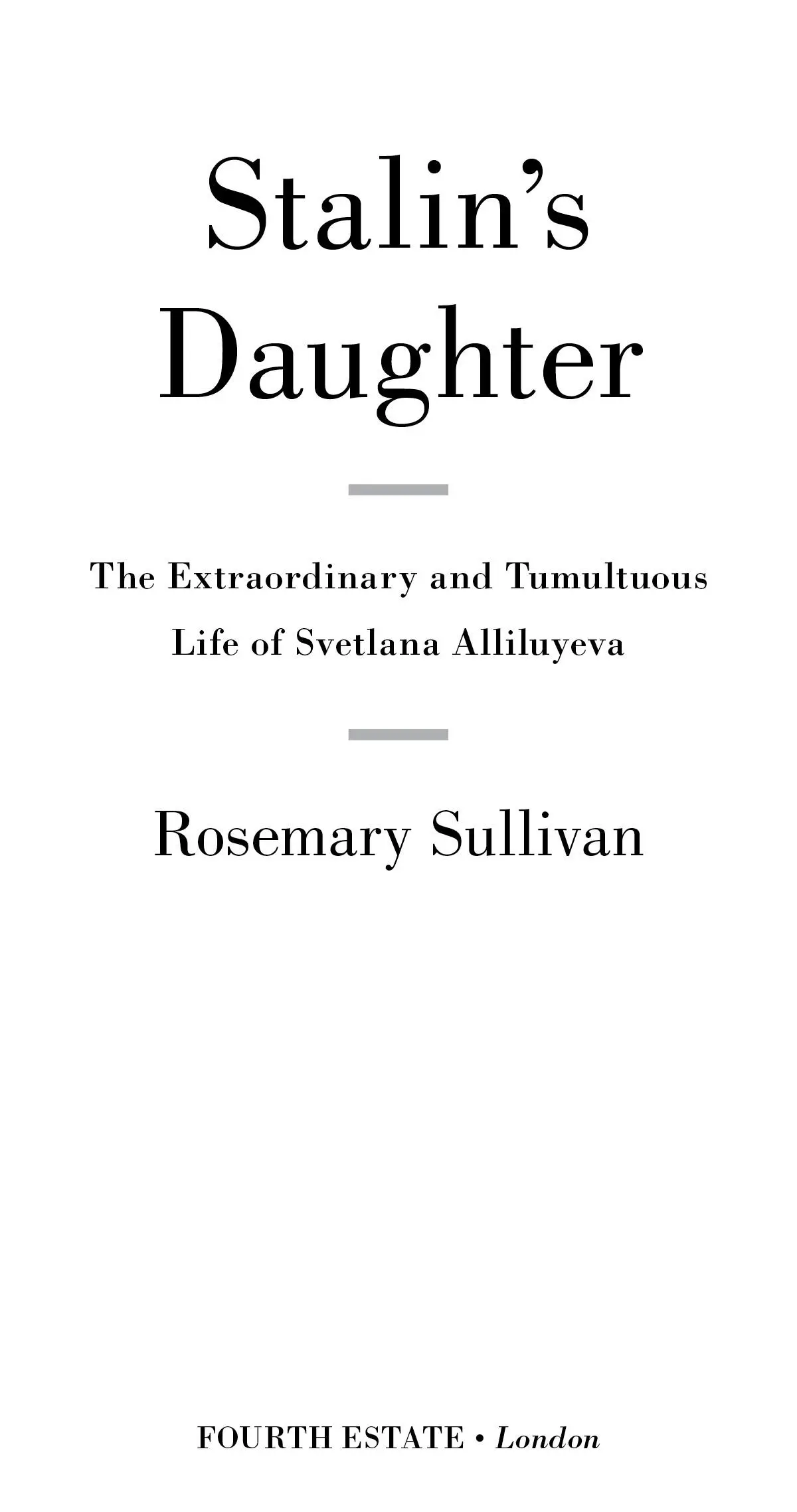
Fourth Estate
An imprint of HarperCollins Publishers
1 London Bridge Street
London SE1 9GF
www.4thestate.co.uk
First published in Great Britain by Fourth Estate in 2015
First published in the United States by Harper in 2015
Copyright © Rosemary Sullivan 2015
Rosemary Sullivan asserts the moral right to
be identified as the author of this work.
Cover photograph © The David King Collection
A catalogue record for this book is
available from the British Library.
All rights reserved under International and Pan-American Copyright Conventions. By payment of the required fees, you have been granted the non-exclusive, non-transferable right to access and read the text of this e-book on-screen. No part of this text may be reproduced, transmitted, down-loaded, decompiled, reverse engineered, or stored in or introduced into any information storage and retrieval system, in any form or by any means, whether electronic or mechanical, now known or hereinafter invented, without the express written permission of HarperCollins.
Source ISBN: 9780007491117
Ebook Edition © June 2015 ISBN: 9780007491124
Version: 2016-06-29
For my mother,
Leanore Marjorie Guthrie Sullivan
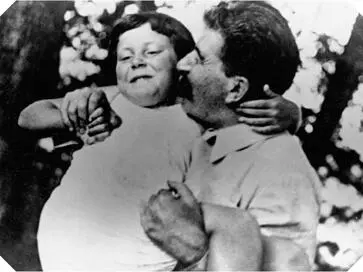
Frontispiece: Eight-year-old Svetlana with her father, Joseph Stalin, on vacation in Soshi.
(Svetlana Aliluyeva private collection; courtesy of Chrese Evans)
Cover
Title Page
Copyright
Dedication
The Djugashvili and Alliluyev Family Trees
Preface
Prologue The Defection
PART ONE: The Kremlin Years
Chapter 1 That Place of Sunshine
Chapter 2 A Motherless Child
Chapter 3 The Hostess and the Peasant
Chapter 4 The Terror
Chapter 5 The Circle of Secrets and Lies
Chapter 6 Love Story
Chapter 7 A Jewish Wedding
Chapter 8 The Anti-Cosmopolitan Campaign
Chapter 9 Everything Silent, as Before a Storm
Chapter 10 The Death of the Vozhd
PART TWO: The Soviet Reality
Chapter 11 The Ghosts Return
Chapter 12 The Generalissimo’s Daughter
Chapter 13 Post-Thaw
Chapter 14 The Gentle Brahman
Chapter 15 On the Banks of the Ganges
PART THREE: Flight to America
Chapter 16 Italian Comic Opera
Chapter 17 Diplomatic Fury
Chapter 18 Attorneys at Work
Chapter 19 The Arrival
Chapter 20 A Mysterious Figure
Chapter 21 Letters to a Friend
Chapter 22 A Cruel Rebuff
Chapter 23 Only One Year
Chapter 24 The Taliesin Fiasco
Chapter 25 The Montenegrin’s Courtier
Chapter 26 Stalin’s Daughter Cutting the Grass
Chapter 27 A KGB Stool Pigeon
Chapter 28 Lana Peters, American Citizen
Chapter 29 The Modern Jungle of Freedom
PART FOUR: Learning to Live in the West
Chapter 30 Chaucer Road
Chapter 31 Back in the USSR
Chapter 32 Tbilisi Interlude
Chapter 33 American Reality
Chapter 34 “Never Wear a Tight Skirt If You Intend to Commit Suicide”
Chapter 35 My Dear, They Haven’t Changed a Bit
Chapter 36 Final Return
Acknowledgments
List of Characters
Sources
Notes
Bibliography
Index
About the Author
Also by Rosemary Sullivan
About the Publisher
The Djugashvili and Alliluyev Family Trees
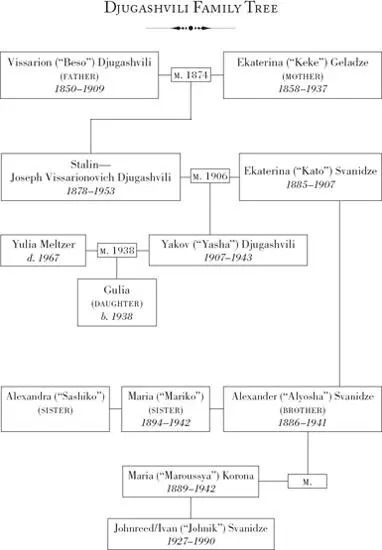
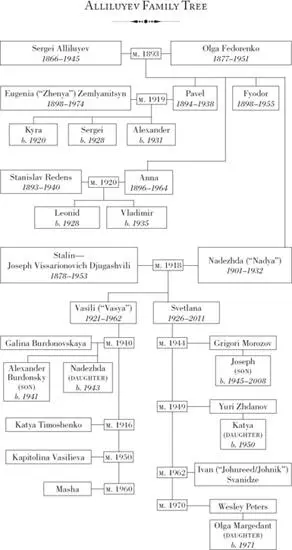
What would it mean to be born Stalin’s daughter, to carry the weight of that name for a lifetime and never be free of it? In the USSR, Stalin was mythic. He was the vozhd , the supreme leader who built the Soviet Union into a superpower and won the war against the Nazis. To his millions of Soviet victims, however, he was the man responsible for the Terror and the infamous Gulag. In the West, he was widely demonized as one of the world’s most brutal dictators. Try as she might, Svetlana Alliluyeva could never escape Stalin’s shadow. As she lamented, “Wherever I go, whether to Australia or some island, I will always be the political prisoner of my father’s name.” 1
In the USSR, her life was unimaginably painful. Her mother, Nadezhda Alliluyeva, committed suicide when Svetlana was only six and a half. In the purges of the Great Terror in the late 1930s, Stalin did not spare his family. Her beloved Aunt Maria and Uncle Alexander Svanidze, the brother and sister-in-law of Stalin’s first wife, were arrested and executed as enemies of the people; their son Johnik, her childhood playmate, disappeared. Uncle Stanislav Redens, the husband of her mother’s sister Anna, was executed. Uncle Pavel, her mother’s brother, died of a heart attack brought on by shock. When she’d just turned seventeen, her father sentenced her first love, Aleksei Kapler, to the Gulag for ten years. The Nazis killed her half brother Yakov in a prisoner-of-war camp in 1943. In 1947 and 1948, during the wave of repression known as the Anti-Cosmopolitan Campaign, her mother’s sister Anna and Pavel’s widow, Zhenya, were sentenced to seven years in solitary confinement. Zhenya’s daughter Kyra was imprisoned and then exiled.
After her father’s death in 1953, the tragedies continued. Her elder brother, Vasili, was arrested and eventually died of alcoholism in 1962. Her literary friends in the mid-1960s were sent to forced-labor camps. When she finally found peace in a loving relationship with a man named Brajesh Singh, she was officially refused the right to marry him before he died, though she was given official permission to carry his ashes back to India.
In the middle of her life, at the age of forty-one, Svetlana Alliluyeva decided, impulsively, to defect. On the evening of March 6, 1967, she walked into the American Embassy in New Delhi requesting asylum. This was both an escape from her past and a search for the freedom denied to her in the Soviet Union, where she claimed that she was treated like government property. The American State Department initially refused her entry into the United States on the grounds that her defection would destabilize relations with the Soviets. She waited in Switzerland as diplomats searched for a country to take her.
When she was finally allowed into the United States on a tourist visa, Americans greeted her as the most famous defector ever to leave the USSR. She was soon the millionaire defector —Twenty Letters to a Friend , the memoir she had written in 1963 and carried out of the Soviet Union, was bought for an advance payment of $1.5 million. But she did not understand the concept of money; she gave away much of it and soon lost the rest to the manipulations of Olgivanna Wright, the widow of Frank Lloyd Wright, who lured her into marriage with Wesley Peters, the head architect of Wright’s Taliesin Foundation. At the age of forty-five, Alliluyeva gave birth to Olga Peters. Her daughter was a consolation. She had abandoned her twenty-one-year-old son, Joseph, and sixteen-year-old daughter, Katya, when she fled the Soviet Union. KGB intrigues prevented her from contacting them for the next fifteen years.
Читать дальше
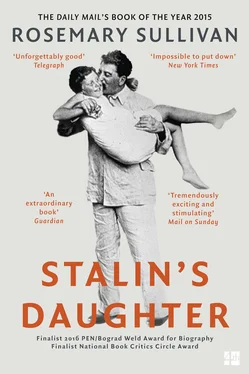














![John Bruce - The Lettsomian Lectures on Diseases and Disorders of the Heart and Arteries in Middle and Advanced Life [1900-1901]](/books/749387/john-bruce-the-lettsomian-lectures-on-diseases-and-disorders-of-the-heart-and-arteries-in-middle-and-advanced-life-1900-1901-thumb.webp)
